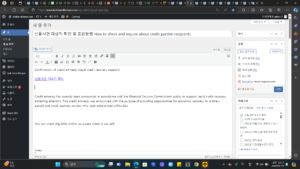Confirmation of credit amnesty (rapid credit recovery support)

Credit amnesty has recently been announced in accordance with the Financial Services Commission’s policy to support rapid credit recovery, attracting attention. This credit amnesty was announced with the purpose of providing opportunities for economic recovery to ordinary people and small business owners who have experienced difficulties.
You can check eligibility online, so please check it yourself.
index
What is credit amnesty?
Target audience and inquiry method
Credit amnesty effect
What is credit amnesty?
This credit amnesty is a measure to delete the delinquent records of people who have repaid all small delinquencies of 20 million won or less from September 2021 to January 2024.
Even if you have outstanding loans, your delinquency record will be deleted when you repay by May 2024. Additionally, the debt adjustment information registration period has been shortened to one year.
Target audience and inquiry method
Those eligible for credit amnesty are divided into individuals and self-employed individuals, and those who have made small delinquencies can check whether they are eligible directly online.
You can check eligibility through the websites of credit rating companies such as Nice Rating Information, Korea Rating Information, Korea Rating Data, SCI Rating Information, and Credit Guarantee Fund.
Check eligibility for credit pardon👉
The credit scores and credit ratings of eligible applicants will automatically increase without a separate application process.
Credit amnesty effect
Benefits and recipients of credit amnesty
Among the approximately 2.9 million people who have delinquent payments of 20 million won or less since September 2021, 2.5 million people who have already repaid will receive delinquent records deleted and credit recovery support.
Even those who have not repaid will have their delinquent records deleted when they repay by the end of May. With these measures, the credit scores of those eligible will increase by an average of 39 points, and new opportunities in the banking industry are also expected.
Controversy and explanation of credit amnesty
There are concerns that it may lead to moral hazard, but financial authorities are refuting this. It was confirmed that the delinquency rate of people whose credit was restored was lower than that of those who were not eligible for amnesty, which is explained as having an effect in suppressing the occurrence of long-term delinquency.
However, the equity controversy still exists. The center of controversy is that people who have already repaid their debt do not receive any benefits.
Effects and prospects of credit amnesty
Credit amnesty is expected to have a positive effect in terms of providing a chance for recovery for those who are actually experiencing financial difficulties.
In particular, it is judged to be persuasive in terms of consideration for vulnerable borrowers who are experiencing difficulties such as the domestic recession. However, experts say that this has calmed down somewhat and some say that credit amnesty in a stable economic situation will have difficulty in being effective.
This credit amnesty is scheduled to be implemented as early as March after establishing a computer system. It is expected that this will lead to rapid credit recovery for those eligible.
The credit amnesty system provides an opportunity for economic recovery for those experiencing financial difficulties, and positive effects such as a reduction in delinquency rates can be expected.
However, equity issues exist and it will take time to evaluate the effectiveness of the policy. Additionally, continuous monitoring and improvement of the credit amnesty policy appears to be important.
Concerns about credit amnesty include moral hazard and equity issues. Some are concerned that this measure will increase debt or encourage careless behavior by individuals, and there are also concerns that the stricter credit evaluation may have a negative impact on the general public.
However, in response to these concerns, the Financial Services Commission believes that it is desirable from a social perspective to provide opportunities for recovery to the common people and small business owners, taking into account the special economic situation in the era of high interest rates and high inflation.
Those whose credit scores and ratings have increased due to credit amnesty will be able to apply for a new loan and have an opportunity for economic recovery. However, there are also concerns about side effects such as worsening soundness of financial institutions and rising interest rates.
This credit amnesty may be positive news for those experiencing financial difficulties, but we must not forget that this is a time that requires careful management and continuous monitoring of the policy.